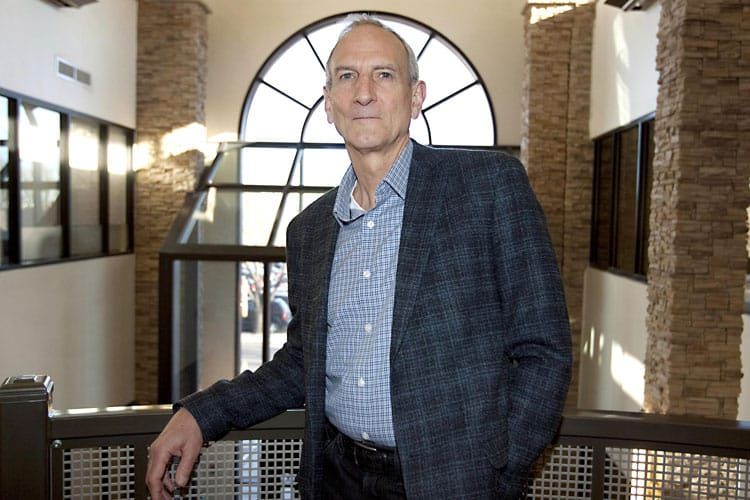Executive Profile: Opgenorth transforms canine cancer treatment

FORT COLLINS — Terry Opgenorth of Fort Collins combined his background in the pharmaceutical industry with the task of finding a research and development project for startup incubator CSU Ventures.
Opgenorth, vice president and executive director of CSU Ventures, found that though pharmaceuticals developed for humans were tested on companion animals, the products often did not benefit them.
Through a six-year process, Opgenorth, who holds a doctorate in physiology, built a 12-member team and went through the steps of taking an idea to market, launching the first conditionally approved drug for canine lymphoma, Tanovea-CA1. He co-founded the company that developed and produced the drug, VetDC, or Veterinary Emerging Technologies Development Corporation, a veterinary-based startup and science-driven company launched in 2010 in Fort Collins that provides anti-cancer treatments for companion animals.
SPONSORED CONTENT
“What we realized is that some of the products we were studying could have potential in veterinary medicine, not just human medicine,” Opgenorth said.
Opgenorth works part time for CSU Ventures and is executive director of NewCo Launchpad, a program of CSU Ventures that launches startup companies out of Colorado State University. At VetDC, he is a board member and the chief scientific officer, charged with identifying canine cancer treatments by studying the trends and scientific literature. His office is at CSU Ventures, 2537 Research Blvd., not at VetDC, which is housed at startup incubator Innosphere, 320 E. Vine Drive.
“I had an idea that got things started. That idea would have gone nowhere without Steven Roy and Steve Warnecke and all the other people on the team,” Opgenorth said, referring to Roy, the chief executive officer Opgenorth brought on board in 2010, and Warnecke, board chairman and chief financial officer.
Opgenorth, a Wisconsin native, came to Fort Collins with his wife, Marla, to be closer to both of their families after he retired in 2007 from a 20-year career at Abbott Laboratories, now AbbVie. His last position was divisional vice president of metabolic disease and antiviral research, among other research activities. He worked in drug discovery and development, leading teams to bring potential products into clinical development.
As Opgenorth became familiar with CSU, he saw that working with CSU Ventures was somewhat similar to his work with Abbott. CSU Ventures, launched in 2007, identifies opportunities for technologies developed at the campus that could be licensed into other companies. Since his time there, Opgenorth helped launch an average of six startups a year and 40 overall.
“I love to start things and build programs. That’s what I’d done for 20 years at Abbott, identifying new opportunities for drug discovery and development and building teams around them,” Opgenorth said. “This, in a way, was a natural extension of that, taking an idea and putting a team around it and creating something that we could make into a reality.”
Opgenorth was particularly interested in the Flint Animal Cancer Center, which provides cancer diagnostic services and treatment of cancers in pet animals, plus provides data for biotechnology companies developing human medicines.
“Often, it’s difficult to get confidence in the data because it’s mice and rats and it’s artificial environmental conditions,” Opgenorth said. “Free-roaming pets are a surrogate for the human population. All different kinds of dogs get disease spontaneously.”
Opgenorth wanted to target human biotechnology companies whose products may have application to veterinary markets, relying on expertise from CSU’s veterinary teaching hospital to evaluate that potential and consider what might be needed to develop a veterinary version of the product. He and his team originally got licenses to develop a glaucoma device for dogs and a diagnostic system for determining certain bacterial infections in horses.
“A lot of really great promising technologies are being developed and explored every day for humans,” Roy said. “Unfortunately despite all of the advancements and 200 plus drugs being studied for cancer, very few will be studied for companion animals. We were able to bring in a promising, novel drug from human companies that had good animal data already.”
The team, which began development for the first two licenses, decided to focus on the third for Gilliad Sciences’ GS 9219, used for the treatment of lymphoma in humans.
“Cancer is a huge problem in dogs,” Opgenorth said, explaining that every year, 200,000 new cases of lymphoma are diagnosed in dogs. “It’s one of the leading causes of death for dogs. Lymphoma, in particular, is one of most common cancers they get.”
VetDC had to identify investors to provide the manufacturing, development and regulatory filing of what now is Tanovea-CA1, work undertaken by Warnecke, the lead investor who rallied the local angel investor community. He identified a venture capital fund and several angel investors, raising $8 million so far.
“It’s a breakthrough drug,” Warnecke said. “For a long time, the veterinarian world has been using generic versions of human cancer drugs to treat animals.”
VetDC also is studying the use of Tanovea-CA1 in cats and licensed VDC-597 to treat tumor cancers that potentially will be ready for market in two years, Opgenorth said.
“Now the drug is on market and doing well. Vets who are using it are very excited about it,” Opgenorth said.
Opgenorth’s connections with the pharmaceutical industry and CSU helped him bring what he recognized as an opportunity into fruition, Roy said.
“What’s most important is his connections with key researchers and experts at CSU to help evaluate these opportunities and to help move our program forward,” Roy said. “He has very good wisdom and judgment, and he provides good feedback. Everything he does is high quality.”
Warnecke likes how Opgenorth combines his business and science backgrounds.
“He is one of those rare individuals who can cross over between the science world and the business world,” Warnecke said. “He is one of those people who has a great business sense of what works and what doesn’t work, and he has a scientific background to understand what we’re doing with our products.”
Besides a love for animals, Opgenorth has an office full of plants and samples of his photography. He likes landscaping and spends time outdoors, riding his bicycle — he rides 3,000 miles a year — hiking and fishing. He currently doesn’t have any dogs but has had them in the past.
“Dogs are a special part of your family. You have an interest in caring for them as a companion,” Opgenorth said. “Veterinary medicine is a very unique part of supporting that element of what’s important to humans, which are companionships with animals.”
FORT COLLINS — Terry Opgenorth of Fort Collins combined his background in the pharmaceutical industry with the task of finding a research and development project for startup incubator CSU Ventures.
Opgenorth, vice president and executive director of CSU Ventures, found that though pharmaceuticals developed for humans were tested on companion animals, the products often did not benefit them.
Through a six-year process, Opgenorth, who holds a doctorate in physiology, built a 12-member team and went through the steps of taking an idea to market, launching the first conditionally approved drug for canine lymphoma, Tanovea-CA1. He…

